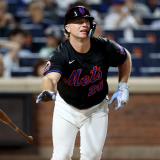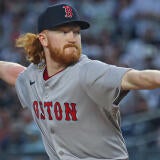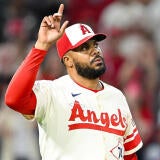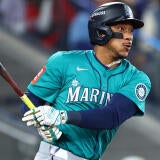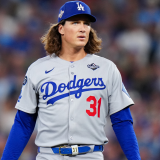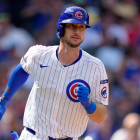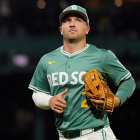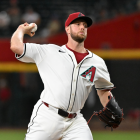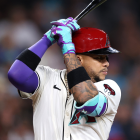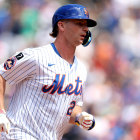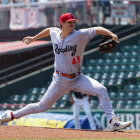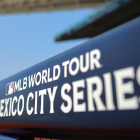Five familiar players out of options, including Jo Adell, a former No. 2 pick and a Yankees history-maker
These five players could be facing a do or die spring
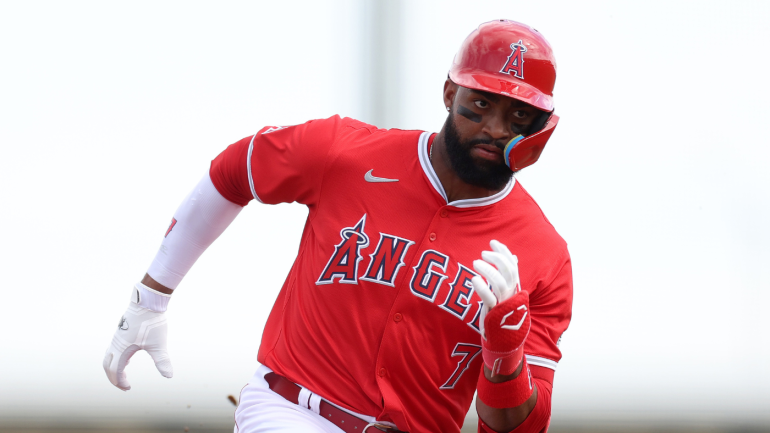
Spring training is a dreadful place to make meaningful player and team evaluations, but that doesn't mean it lacks educational value. From a certain perspective, spring training can provide a deeper understanding of how baseball and life work.
Nature usually works in cycles. In order for one thing to begin, another thing has to end. That can mean innings, games, seasons … and, down the road, stints with a particular team. Baseball's roster mechanisms being what they are, this is the time of the year when the phrase "out of options" begins to worm its way into discussions about how teams will select the players on their Opening Day rosters.
For those who keep baseball's jargon at arm's length: players typically have three "option years" after being added to the 40-player roster (though some are granted a fourth because of injury or other circumstances). During those years, they can be demoted to the minors or promoted to the majors almost at will. There are in-season option caps in place now, but for the sake of simplicity we'll ignore those.
The important takeaway is that once a player exhausts their options, they're inevitably at a crossroads: either they establish themselves and remain in place, or they prepare to be traded, waived, and perhaps even outrighted back to the minors. Being a player without options, then, means being a player in a liminal space.
With that in mind, CBS Sports has chosen five notable players who, according to FanGraphs' Roster Resource, are out of options this spring. These players range from former top prospects to former history-makers. What they have in common is that they're on the bubble. Below, we've chronicled why you likely know their name; what has gone wrong for them during their big-league careers; and issued a verdict on what comes next. As always, keep in mind that this is more of an art than a science, and that the players are presented in alphabetical order.
1. Jo Adell, OF, Angels
Why the name sounds familiar: Adell was considered to be one of the sport's best prospects as recently as 2020. We ranked him No. 2 that spring, and we weren't alone.
Jo Adell TRIPLES to get us going‼️@Angels | #LAASpring pic.twitter.com/eBzBBkHeQn
— Bally Sports West (@BallySportWest) February 24, 2024
What's gone wrong: Everyone overestimated Adell's hit tool. He still offers a dynamic skill set. He runs well and he can impact a baseball like few others can -- his 117.2 mph maximum exit velocity in the majors last season puts him in Yordan Alvarez territory -- but a raging inability to make consistent contact has sunk his chances for stardom. Adell has posted Gallonian contact rates at the big-league level, whiffing on nearly 40% of his swings overall and 30% of those that have been taken on in-zone pitches. Even in this day and age, it's hard to be a plus contributor with those marks.
Verdict: The Angels are projected to have Adell on their bench. Incumbent starter Mickey Moniak seems like a massive crater risk after striking out more than 12 times for every walk last year, and it's hard to count on Aaron Hicks being a stabilizing force given how poorly he's performed for most of the last three years. As such, we think the Angels will hold onto Adell just in case -- and that he might get another opportunity, here in his age-25 season, to make good on some of that old promise.
2. Joey Bart, C, Giants
Why the name sounds familiar: Bart was the No. 2 pick in the draft by way of Georgia Tech. (For those wondering, that was the year Casey Mize went No. 1.)
Joey Bart has had a solid spring and this might go down as his favorite moment. That’s his college teammate he threw out at third. Bart said “that’s my boy” to the hitter at the plate. pic.twitter.com/Lco6azhlDW
— Alex Pavlovic (@PavlovicNBCS) March 12, 2023
What's gone wrong: Bart always had some swing and miss to his game, resulting in threatening strikeout rates dating back to his Double-A days. The expectation was that he would slug and defend well enough to make it work anyway. Alas, that has not happened. Bart has appeared in a full season's worth of big-league games, 162 on the nose, and has 11 home runs to speak of -- and all of those were contained to 2022. He's underwhelmed on the defensive side, too, grading as a well-below-average goalie.
Verdict: Barring an injury, there's no room for Bart in San Francisco. The Giants employ Patrick Bailey (a true defensive whiz) and Tom Murphy (an alternate-universe version of Bart), as well as former Rule 5 pick Blake Sabol, who, we'll note, appeared in more games behind the dish for them last year than Bart did. We do think Bart will find a gig as a backup elsewhere, either as a result of a late-spring trade or waiver claim.
3. Roansy Contreras, RHP, Pirates
Why the name sounds familiar: Contreras was the most interesting prospect the Yankees sent to the Pirates in the Jameson Taillon trade in January 2021. He threw 42 innings of 2.76 ERA ball to begin his age-22 season, but it's been all downhill from there.
Roansy Contreras, Chalked 95mph Fastball. 🤖 pic.twitter.com/f4efWcOa0w
— Rob Friedman (@PitchingNinja) April 26, 2023
What's gone wrong: Contreras has bled velocity since, with his rising fastball checking in more than a mile per hour slower in 2023 than it did in 2022. He's altered his pitch mix to try to compensate for that development, deploying his slider as his primary offering. Unfortunately, that tweak didn't prevent batters from brutalizing the fastball, with opponents hitting .381 with a .598 slugging percentage against it in 2023.
Verdict: Contreras didn't make an appearance at the big-league level after July 5, suggesting he's walking on thin ice. The Pirates have some high-grade young arms nearing their big-league arrival dates. If we had to guess, Contreras will be part of the Opening Day bullpen. Whether or not he's there come June 1 is to be determined.
4. Deivi García, RHP, White Sox
Why the name sounds familiar: Another former Yankees arm, García became the youngest pitcher in franchise history to start a postseason game in 2020. He's started all of two big-league games in the subsequent three seasons.
Deivi dealt!@Yankees pitching prospect Deivi García tossed 2 2/3 scoreless innings with 4 strikeouts in his 2023 debut for the @swbrailriders: https://t.co/GcK5ZW9E7R pic.twitter.com/Vj3Q9RyeP4
— Minor League Baseball (@MiLB) April 2, 2023
What's gone wrong: When we ranked García as the 50th best prospect in 2020, we noted: "But, at the same time, his delivery does feature some tics -- throwing across his body; recoil on the follow through -- that can rob pitchers of command. Whichever way Garcia's command goes, he remains extremely young." His command has since flown south while his age has trekked north. To wit, he walked more than six batters per nine innings in Triple-A last season, and he's now nearing his 25th birthday.
Verdict: There are a few things working against García making the Opening Day roster, his recent results being the biggie. It can't help his case that the White Sox's projected bullpen features little to no flexibility. Teams tend to like to have at least a few spots they can use for revolving door purposes. Given García's (good, in our estimation) chances of clearing waivers, we think they could excuse bumping him this spring.
5. Carter Kieboom, INF, Nationals
Why the name sounds familiar: Kieboom was a first-round pick who made several top-50 lists prior to debuting in 2020 thanks to above-average offensive projections. At one point in time, he seemed like the heir apparent to Anthony Rendon.
In Carter Kieboom's first @MLB AB since 2021 ...
— Washington Nationals (@Nationals) August 22, 2023
HE BACK pic.twitter.com/jhCHFCskOq
What's gone wrong: Kieboom has received looks of varying length over four separate seasons. Those auditions range from 11 games to 62 -- or, from two weeks' to two months' worth -- yet he hasn't posted an OPS+ higher than 74 in any of them. Kieboom's underlying data indicates he hasn't much skill for impacting the ball, making it difficult for him to live up to those old expectations. To make matters worse, his defense has graded as below-average as well, and he turned 26 in September. The clock is ticking.
Verdict: The Nationals are on the cusp of promoting some of the game's best and brightest positional prospects to the majors. That means that, even if Kieboom survives the last round of spring cuts (and we suspect he will), he could find himself waived this summer if he doesn't perform at what would be career-high levels.



